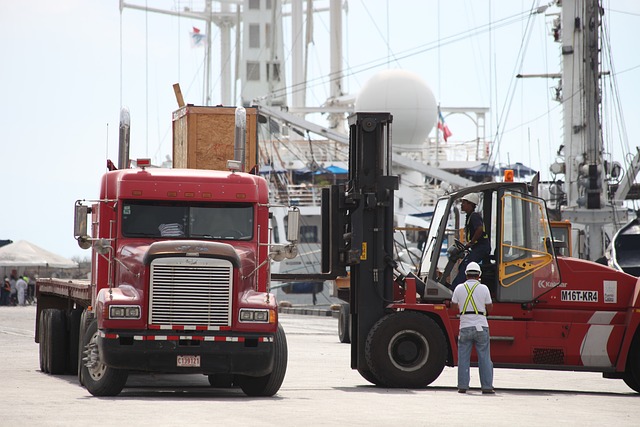Small fleet freight insurance is a specialized coverage for businesses operating under 10 vehicles, addressing unique trucking and logistics risks. This guide breaks down key components: liability coverage, cargo protection, and driver/vehicle provisions. Businesses can ensure compliance with regulations and minimize financial exposure by understanding these aspects and consulting expert brokers. Navigating complex legal requirements and diverse cargo types demands adaptive policies, risk management strategies, and accurate documentation. Best practices like staying informed, staff training, and digital platforms simplify compliance. Effective compliance management is crucial for success in the competitive small fleet freight insurance market.
In the dynamic landscape of logistics, ensuring compliance with cargo insurance regulations is paramount for small fleet operators. This comprehensive guide delves into the intricacies of small fleet freight insurance, shedding light on common challenges and offering strategic solutions. From navigating complex policy terminologies to managing risk efficiently, we explore best practices and tools designed to streamline compliance. Additionally, real-world case studies highlight successful strategies, providing valuable insights for operators seeking seamless navigation in this essential aspect of their business.
Understanding Small Fleet Freight Insurance: A Comprehensive Guide

Small fleet freight insurance is a specialized coverage designed for businesses operating a limited number of vehicles, typically under 10. Unlike general business or commercial policies, small fleet insurance offers tailored protection for the unique risks associated with trucking and logistics. This comprehensive guide aims to demystify this type of insurance, helping business owners navigate the challenges of compliance with cargo insurance regulations.
Understanding the nuances of small fleet freight insurance involves recognizing its key components: liability coverage for damage or loss during transport, cargo protection against theft or damage, and specific provisions for drivers and vehicles. By examining these elements closely, businesses can ensure they meet regulatory requirements while minimizing financial exposure. Moreover, seeking expert advice from insurance brokers specializing in trucking can significantly enhance the selection process, offering insights into the best policies to address individual business needs effectively.
Common Challenges in Cargo Insurance Compliance

In the realm of small fleet freight insurance, navigating compliance with cargo insurance regulations presents a unique set of challenges. One of the primary hurdles is keeping up with ever-evolving legal requirements and industry standards. As regulatory bodies introduce new directives to enhance safety and security, businesses must swiftly adapt their insurance policies to remain compliant. This often involves intricate processes like updating coverage limits, incorporating specific risk management strategies, and ensuring accurate documentation.
Another common challenge arises from the diverse nature of cargo types and shipping routes. Small fleet owners frequently deal with perishable goods, hazardous materials, or valuable commodities, each requiring distinct insurance considerations. In addition, international shipments introduce complexities related to varying country-specific regulations, customs clearance, and potential language barriers. Efficiently managing these variations while maintaining compliance can be a complex task for fleet managers, necessitating meticulous planning and close collaboration with insurance providers.
Strategies for Seamless Navigation: Best Practices and Tools

Navigating the complex landscape of cargo insurance regulations can be a daunting task for businesses, especially those operating with a small fleet of freight vehicles. However, implementing strategic best practices and utilizing specialized tools can streamline this process significantly. One crucial practice is staying informed about industry updates and changes in policies, ensuring that all documentation and procedures comply with current standards. Regular training sessions for staff involved in logistics and insurance management are essential to foster a culture of adherence to regulations.
Additionally, investing in user-friendly digital platforms designed for small fleet freight insurance can automate many compliance tasks. These tools often offer features like policy management, claims tracking, and real-time data updates, enabling businesses to monitor and maintain their coverage effectively. By embracing these technologies and adopting a proactive approach, companies can ensure they remain compliant, mitigate risks, and foster trust with both clients and insurers in the small fleet freight insurance market.
Case Studies: Success Stories of Effective Compliance Management

In the realm of small fleet freight insurance, effective compliance management is not just a regulatory requirement but a key differentiator between success and failure. Case studies from leading companies offer valuable insights into how proactive compliance strategies can mitigate risks and enhance operational efficiency. For instance, consider a regional trucking company that implemented a comprehensive digital solution to track cargo movements in real-time. By leveraging advanced technology, they not only improved transparency but also streamlined the claims process, ensuring rapid settlement and reducing administrative burdens.
Another success story involves a logistics startup that prioritized compliance education for its staff. Through regular workshops and access to specialized resources, employees became adept at navigating complex insurance regulations. This proactive approach led to fewer errors, quicker issue resolution, and ultimately, enhanced client satisfaction. These examples underscore the importance of tailored compliance management in small fleet freight insurance, demonstrating that a strategic and educated approach can yield significant benefits across the board.
In navigating the complex landscape of cargo insurance regulations, understanding the unique needs of small fleet freight operations is key. By addressing common challenges and adopting best practices outlined in this guide—including leveraging specialized tools and learning from successful case studies—small fleet owners can ensure seamless compliance with confidence. Embracing these strategies empowers businesses to focus on what they do best: efficiently transporting goods while mitigating risks. Ultimately, prioritizing robust insurance compliance enables small fleets to thrive in today’s competitive market.
